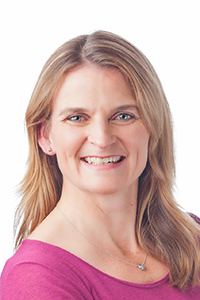 Timberly George Ambler (she/her) knew from a young age that she wanted to be a physiotherapist. All thanks to a physiotherapist in her community who became one of her earliest and longest-standing mentors in her life. She obtained a Bachelors of Kinesiology from SFU and worked as a kinesiologist for 4 years while racing road bikes and travelling the world. Timberly graduated from UBC with a Bachelors of Science in Physiotherapy in 2004.
Timberly George Ambler (she/her) knew from a young age that she wanted to be a physiotherapist. All thanks to a physiotherapist in her community who became one of her earliest and longest-standing mentors in her life. She obtained a Bachelors of Kinesiology from SFU and worked as a kinesiologist for 4 years while racing road bikes and travelling the world. Timberly graduated from UBC with a Bachelors of Science in Physiotherapy in 2004.
Following graduation, Timberly followed her dream to become a sport physiotherapist and was awarded her Sport Physio Diploma, with Distinction, in 2007. he worked her way up the ranks from club sport to National Level programs in Field Hockey and Rugby and most recently spent a season with the Vancouver Canucks. Timberly is a partner at City Sports + Physio Clinic in downtown Vancouver and spends most of her free time in the outdoors, mountain biking, trail running, hiking with her dog, or volunteering for the Lions Bay Search and Rescue team.
What drew you to the Master of Physical Therapy at UBC?
Knowing I wanted to be a physio from age 16, I started researching the process in high school and saving for my tuition. UBC was the only school offering physiotherapy in BC, and as much as getting out of dodge sounded exciting, financially it was out of reach. I knew there would be benefits in making professional connections in the same province I grew up in and planned to spend my life in.
What is your favorite memory from your time at UBC?
Attempting to play quarterback in the annual charity football game between the School of Nursing and the School of Rehab Sciences. My attempt lasted two practices before I decided I was a better team manager! It was a super fun event for a great cause that brought out a lot of people from around campus.
What has been your journey since graduating from UBC?
After graduation in 2004, I went straight into private practice working for my earliest mentor in life, out in White Rock. I knew I wanted to pursue my post graduate training as a sport physiotherapist so eventually I sought out a clinic and more mentors who would support me through that process. I spent countless hours on the sidelines of various sports, most notably rugby and field hockey.
I worked my way up to eventually working with the Canadian National teams and being fortunate to travel the world with them. My work with athletes and teams has had a massive positive impact on my clinical practice and growth of my career. I worked at the Vancouver 2010 Olympics, the World University Games in China, with the Vancouver Canucks for the 2021/22 season, and will be heading to the 2023 Canada Winter games in Prince Edward Island.
I have been a partner at City Sports + Physio clinic since 2013 and have been a clinical faculty instructor and teaching assistant in the UBC Department of Physical Therapy since 2010. And as a sucker for volunteerism, I joined the Lions Bay Search & Rescue team in early 2020.
What do you find most interesting about a career in physical therapy?
I find it interesting that no matter what type of social event you’re at, once you tell a complete stranger you are a physiotherapist, you will be asked about their sore shoulder! Joking aside, I find it interesting that even though I never wanted to be a teacher, I have become one. For every patient, I am teaching them about their body, their injuries, and the healing process. And I love it.
Where do you find inspiration?
In the mountains of the North Shore, when I’m hiking with my dog, mountain biking with my husband and friends or out for a solo trail run. The fresh mountain air is invigorating and cleansing. Cooking is a close second – I can get lost in trying a new recipe and spend a whole afternoon at it.
What is one thing you hope to accomplish?
To become fluent in the language of Italian – both in speaking and cooking!
What does a healthy society mean to you?
To me, a healthy society is one in which everyone, regardless of who they are or where they live, has access to the care they need, when they need it. That resources are available, and the system can provide them without being overwhelmed. That healthcare workers work together to advocate for and manage each person’s needs without stumbling blocks getting in the way.


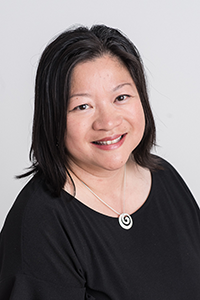 Grace Shyng (she/her) is a Registered Audiologist and Hearing Instrument Practitioner. Grace is qualified to provide hearing assessments; hearing aid services; tinnitus management services; cerumen management (fancy word for earwax removal); custom noise, musician or swim plugs; and communication accessibility consultations, where she explores ways to help make employment, educational, and social listening environments more communication-friendly. (Think of the last time you were at a meeting or restaurant and couldn’t hear what everyone said. Grace can help with that!). She is a proud UBC alumna: B.A. (1991 – Speech Sciences) and M.Sc. (1995 – Audiology). Grace is also passionate about clinical education: she has been a Clinical Assistant Professor with the UBC School of Audiology and Speech Sciences since 2001, and in 2009 she was honored to be the inaugural recipient of the School’s Noelle Lamb Award for Excellence in Clinical Education.
Grace Shyng (she/her) is a Registered Audiologist and Hearing Instrument Practitioner. Grace is qualified to provide hearing assessments; hearing aid services; tinnitus management services; cerumen management (fancy word for earwax removal); custom noise, musician or swim plugs; and communication accessibility consultations, where she explores ways to help make employment, educational, and social listening environments more communication-friendly. (Think of the last time you were at a meeting or restaurant and couldn’t hear what everyone said. Grace can help with that!). She is a proud UBC alumna: B.A. (1991 – Speech Sciences) and M.Sc. (1995 – Audiology). Grace is also passionate about clinical education: she has been a Clinical Assistant Professor with the UBC School of Audiology and Speech Sciences since 2001, and in 2009 she was honored to be the inaugural recipient of the School’s Noelle Lamb Award for Excellence in Clinical Education. 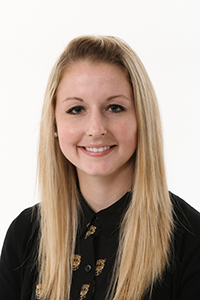 Dr. Sarah Courtice (she/her) completed both her medical degree and residency training in Physical Medicine and Rehabilitation at the University of British Columbia. She works on the Acquired Brain Injury and Adult Concussion Service programs at GF Strong Rehabilitation Centre. Dr. Courtice also enjoys working with the pediatric/adolescent population through the Adolescent/Young Adult rehabilitation program, as well as the Spinal Cord Clinic at BC Children’s Hospital. She currently volunteers with the UBC Medical Alumni Association in the role of Vice President, Vancouver Medical Program.
Dr. Sarah Courtice (she/her) completed both her medical degree and residency training in Physical Medicine and Rehabilitation at the University of British Columbia. She works on the Acquired Brain Injury and Adult Concussion Service programs at GF Strong Rehabilitation Centre. Dr. Courtice also enjoys working with the pediatric/adolescent population through the Adolescent/Young Adult rehabilitation program, as well as the Spinal Cord Clinic at BC Children’s Hospital. She currently volunteers with the UBC Medical Alumni Association in the role of Vice President, Vancouver Medical Program.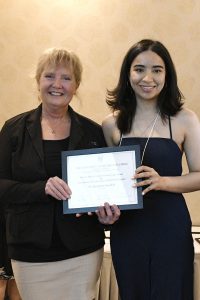
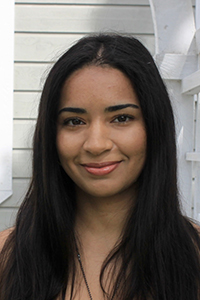 Claudia Singh (she/her) is a recent graduate of the BMLSc Program and recipient of the William J. Godolphin Prize for Excellence in Critical Thinking and the Outstanding Performance in PATH 405 award. She considers herself a lifelong learner and a huge nerd for everything from hematology to working out to sports like golf, soccer, hockey, and basketball. Claudia enjoys clinical research and through the Faculty of Medicine Summer Student Research Program was able to carry out a project under the supervision of Dr. Audi Setiadi at BC Children’s Hospital and present a poster at the International Clinical Cytometry 2021 Meeting. She hopes to pursue a career in medicine and engage in teaching, research, and mentoring throughout her career. When Claudia is not working or studying, you can find her spending time with family and friends or on the golf course.
Claudia Singh (she/her) is a recent graduate of the BMLSc Program and recipient of the William J. Godolphin Prize for Excellence in Critical Thinking and the Outstanding Performance in PATH 405 award. She considers herself a lifelong learner and a huge nerd for everything from hematology to working out to sports like golf, soccer, hockey, and basketball. Claudia enjoys clinical research and through the Faculty of Medicine Summer Student Research Program was able to carry out a project under the supervision of Dr. Audi Setiadi at BC Children’s Hospital and present a poster at the International Clinical Cytometry 2021 Meeting. She hopes to pursue a career in medicine and engage in teaching, research, and mentoring throughout her career. When Claudia is not working or studying, you can find her spending time with family and friends or on the golf course.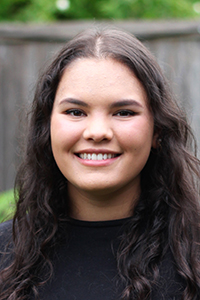 Taylor Da Silva (she/her) recently graduated from the BMLSc class of 2022. In her fourth year, Taylor completed the PATH 438 directed studies research course in the Devine lab at the Centre for Blood Research. She studied the expression of certain proteins in platelet concentrates during storage to identify biomarkers for the prediction of platelet transfusion outcomes. Taylor is interested in blood research and transfusion medicine specifically due to her family’s history with blood disorders. Her younger sister was diagnosed with aplastic anemia in 2011 and has since made a full recovery, and Taylor has had immune thrombocytopenic purpura since 2014.
Taylor Da Silva (she/her) recently graduated from the BMLSc class of 2022. In her fourth year, Taylor completed the PATH 438 directed studies research course in the Devine lab at the Centre for Blood Research. She studied the expression of certain proteins in platelet concentrates during storage to identify biomarkers for the prediction of platelet transfusion outcomes. Taylor is interested in blood research and transfusion medicine specifically due to her family’s history with blood disorders. Her younger sister was diagnosed with aplastic anemia in 2011 and has since made a full recovery, and Taylor has had immune thrombocytopenic purpura since 2014.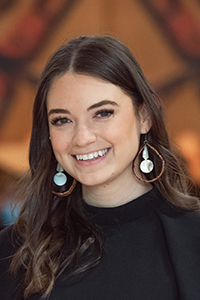 Jorden Hendry (she/her) is a mixed settler/Tsimshian and a member of the Lax Kw’alaams band. She recently completed a Master of Public Health from UBC and will be starting a PhD program in September 2022. Jorden’s area of interest during her studies has been Indigenous Public Health and understanding the systems that drive health disparities. She intends to better understand the prevalence and factors associated with experiences of racism to inform policy and service provision. Her work also focuses on integrating Indigenous ways of knowing into multiple levels of governance at UBC, doing so through serving on committees at the School of Population and Public Health and being a graduate student representative to the UBC Vancouver Senate.
Jorden Hendry (she/her) is a mixed settler/Tsimshian and a member of the Lax Kw’alaams band. She recently completed a Master of Public Health from UBC and will be starting a PhD program in September 2022. Jorden’s area of interest during her studies has been Indigenous Public Health and understanding the systems that drive health disparities. She intends to better understand the prevalence and factors associated with experiences of racism to inform policy and service provision. Her work also focuses on integrating Indigenous ways of knowing into multiple levels of governance at UBC, doing so through serving on committees at the School of Population and Public Health and being a graduate student representative to the UBC Vancouver Senate.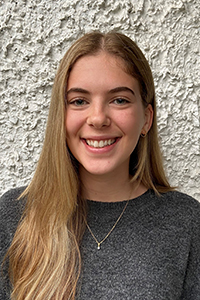 Allie Proctor (she/her) is a recent graduate of the BMLSc program at UBC. During her time in the BMLSc program, Allie explored her interest in lab work and pathology, and has made steps towards her future career. Allie has found a passion in the field of genetics and her goals are now shifted towards becoming a clinical genetics technologist. Having grown up in Parksville on Vancouver Island, the majority of her hobbies revolve around spending time outdoors doing activities, such as hiking and camping.
Allie Proctor (she/her) is a recent graduate of the BMLSc program at UBC. During her time in the BMLSc program, Allie explored her interest in lab work and pathology, and has made steps towards her future career. Allie has found a passion in the field of genetics and her goals are now shifted towards becoming a clinical genetics technologist. Having grown up in Parksville on Vancouver Island, the majority of her hobbies revolve around spending time outdoors doing activities, such as hiking and camping.